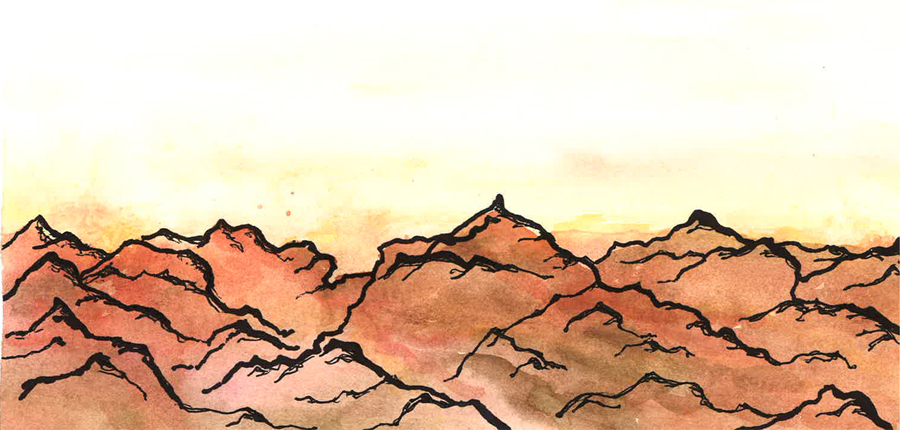The Journey
Ruth 1:6-22
(Click here to listen to the second teaching in the Ruth study.)
Scene II of our drama brings the spotlight onto the three widows: Naomi, determined to travel back to her land of Israel alone; Ruth, equally determined to find and follow Naomi’s God; and Orpah, uncertain which path to take.
An argument ensues. Naomi, painting the bleakest possible picture of the life that lies ahead, manages to convince Orpah to turn back to the relative safety and security of her old life. Ruth, on the other hand, resolves to forsake all and follow the way of her mother-in-law.
In a beautiful soliloquy which we often hear reiterated at weddings, Ruth declares her intention to go with Naomi, adopting Naomi’s people, land, and God as her own.
Orpah kisses. Ruth clings.
Orpah turns back. Ruth forges forward.
The path Ruth takes with Naomi is dangerous and filled with hardship. Much like our own determination to follow Jesus, these women must set their eyes on the hope ahead of them in order to endure. They must face each obstacle head on, courageously depending on God to show them the way and give them the strength to move forward.
Our own journey takes a similar road. The prophet Isaiah called it the Highway of Holiness. It is a road where the Redeemed walk safe, though surrounded by “wilderness and desert,” a road leading to a place where, at long last, “sorrow and sighing flee away.”
Come along with these two women who are so much like us. Delve into their story, identify with their fears and failures. Rise up with their hopes and triumphs. These women are here to show us the way to the One who captures our hearts and holds us safe in His love forever.
#1:
“WE ALSO PRAY THAT YOU WILL BE STRENGTHENED WITH HIS GLORIOUS POWERSO THAT YOU WILL HAVE ALL THE PATIENCE AND ENDURANCE YOU NEED…” COLOSSIANS 1:12 FRAGMENT NLT
#2:
Colossians 1:9-12
Colossians 2:1-7
Psalm 143
#3:
The Beauty of Kindness
How must Ruth have felt that day as she trudged towards Naomi’s land? She was a despised Moabitess, attempting to slip unobtrusively into the tiny town of Bethlehem. She couldn’t remain unnoticed for long. Everything about her was different: the way she dressed, the way she wore her hair, even the halting way she spoke as she struggled to wrap her tongue around those strange Hebrew vowels. But it was her history that was her undoing.
Ruth the Moabitess.
Her title defined her.
Worlds of prejudice were wrapped up in that word.
All that was evil and immoral,
Dangerous and undignified,
She was a bad woman.
Sometimes I feel summarized in much the same way.
Stuck in a role that everyone expects of me.
A role that chafes and irritates.
A role that confines and defines me.
A role that doesn’t fit very well,
like a too-short t-shirt - so uncomfortable!
And yet, passively, I plod on, doing what I’ve always done, being who I’ve always been, caught in a catch-22 of my own making. What else is a woman to do?
What did Ruth do?
This woman defied the discouraging expectations of others. She didn’t set out to prove them wrong. No speeches about giving her a chance. No long soliloquies explaining herself to her skeptics. She simply served. Quietly, Ruth rebuilt her reputation by serving the one woman who really needed her: Naomi. She broke the bonds of people’s expectations by gathering grain, showing kindness, sharing a meal, and taking initiative.
Doing what she could.
Doing what she should.
She didn’t sit around hoping someone would do the right thing. There was nothing passive about Ruth. That girl just got out there and went to work. I love it!
I love how the Bible, upon a closer look, blows our picture of piety. Ruth is applauded for aggressively going after the lowest job of all - gleaning. Instead of letting this desperate act ruin her life forever, she builds her future on the beauty of her kindness. She entices the man of her dreams not by sexual seduction, but by the sweet allure of servanthood. Rather than allow her history to limit her, she uses it to propel her to greatness.
Now that’s a picture of bold, biblical womanhood!
From my heart,
Diane
ETC:
The Moabites
The Moabites were the archenemies of Israel. Not opponents to be feared or revered, nor foes to challenge the mightiest of their warriors. The Israelites despised these enemies on their border for their weak and deceitful ways. Their lineage didn’t help, descended from the incestuous relationship between Abraham’s nephew, Lot, and his oldest daughter. The Moabites were named after the son of that drunken seduction (see that story in Genesis 19:30-38). And their women were the worst.
Their story goes back a ways…
More than 150 years earlier, during the long and arduous trek through the wilderness, Moses had sent a diplomatic envoy to request permission to cross through the land of Edom on what was known as “The King’s Highway.” Even with assurances that the Israelites would not trample their farmland or use up their water, the king refused, sending an imposing force to intimidate the travelers (Numbers 20:14-21). Apparently, Moab was a part of this alliance against the Israelites (Judges 11:17) beginning a blood feud which would last for at least ten generations (Deuteronomy 23:3-6).
The biblical portrayal of the character of the Moabites was less than admirable. Proud and arrogant (Isaiah 16:6), idolatrous (1 Kings 11:7), superstitious (Jeremiah 27:3, 9), rich and confident (Jeremiah 48:7), men of war (Jeremiah 48:14), hostile to Israel (Psalm 83:6)-not exactly the kind of people you want living next door.
Tensions between the nations worsened when Balak, king of Moab, called for the prophet Balaam to come and curse Israel. And while Balaam certainly tried, he was unable to effectively cast a curse on this nation who was under the protection and guidance of the Almighty. Yet what havoc the errant prophet was powerless to create through divination, the women of Moab succeeded in wrecking through seduction. The story, found in Numbers 25, began with just “some” men accepting the invitations of the Moabite women to join them in the sexually erotic worship of their gods, but the destruction spread to involve the deaths of 24,000 people in Israel. While Balaam attempted unsuccessfully to turn the Lord against His people, he was sadly successful at turning God’s people away from their Lord. The tragedy struck a stunning blow to the fledgling nation. How a small group of Moabite and Midianite women could seduce thousands of Israelite men away from their declared intention to be faithful followers of Yahweh became the ultimate horror and humiliation for every family in Israel.
Much like pornography today, these people “devoted themselves to shame and they became as detestable as that which they loved” (Hosea 9:10 NLT). Their idolatrous sexual sins are held up once again in the letter to the church in Pergamum, as dangerous deviations from God’s plan to bless their lives (Revelation 2:14-16).
No wonder the Israelites in Naomi’s day looked somewhat suspiciously at her daughter-in-law Ruth. The thought of a young Moabite widow in their small town must have sent tremors through their tight-knit community. Was she a seductress like her ancestors? A blatant heathen who would bring her erotic gods to entice their men? These women would have been understandably reluctant to welcome Ruth into their midst. She would have to prove herself first, and to be very careful to watch her back while she did so.


